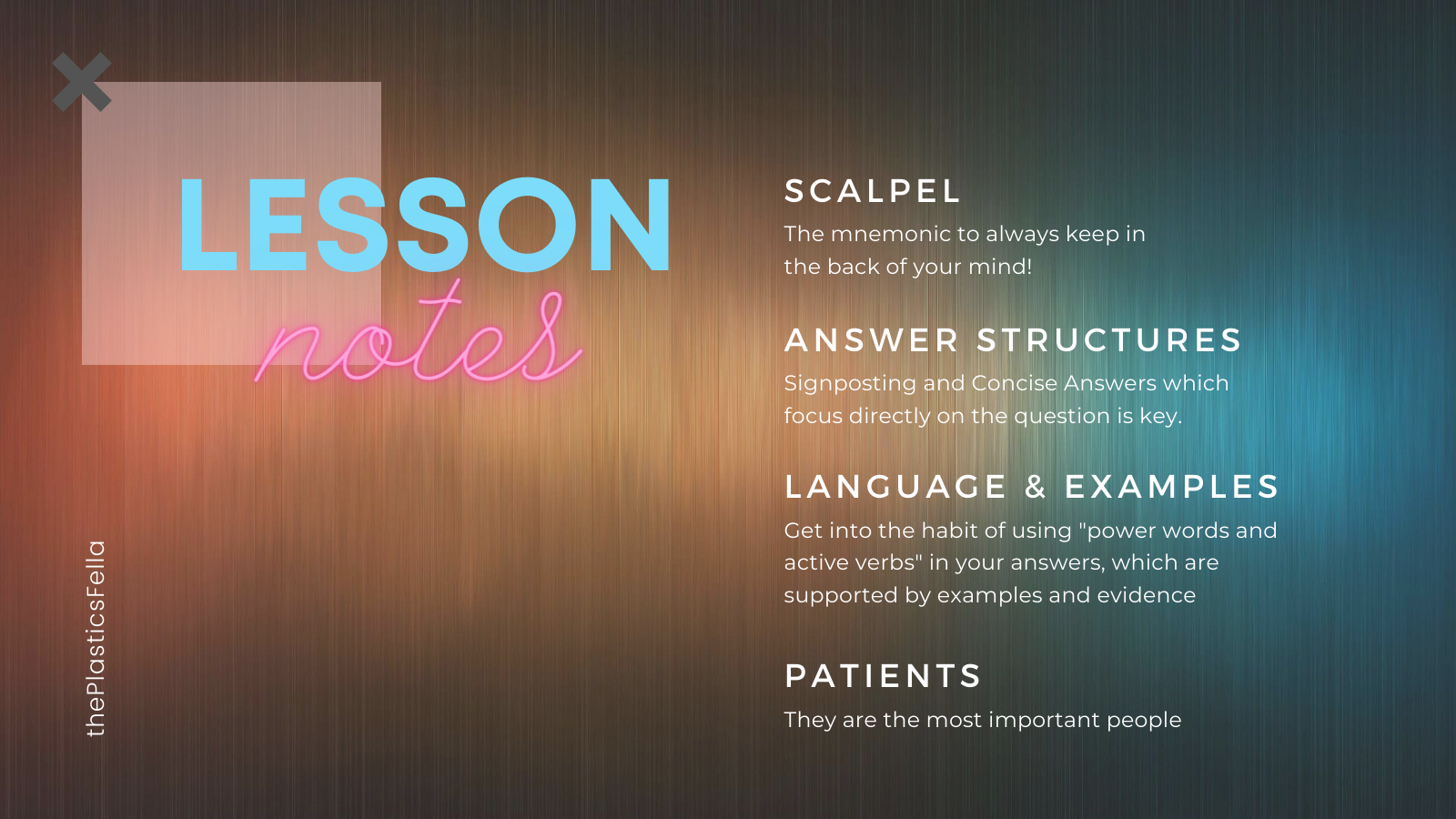1. Structure: Signpost and list.
2. Concise answers: Never too long.
3. Answer directly: Don't be vague.
4. Language: Power words, active verbs.
5. Patient-centred: Most important people!
6. Examples: Support your statements.
7. Look forward! Never reflect on bad answers.
Structure
Key Point
Effectively structuring your answers is crucial. Here, we focus on using signposting and listing to provide clear and memorable responses.
There is a large amount of evidence suggesting humans (in non-stressful environments) can only remember 3-4 points. One can only assume that this number is reduced in the stressful environment of the interview. Signposts and lists are an easy way for you to remember your answers, and more importantly for the interviewer to follow your answer.
- Good Candidate: "To address this question, I will first discuss A, then B."
- Poor Candiate: "I will talk about several things related to this question."
This approach clearly outlines the structure of the response, making it easier for the interviewer to follow and understand the candidate's thought process. It shows organizational skills and the ability to communicate effectively.
Many candidates can signpost, but here are some of the techniques P'Fella recommends.
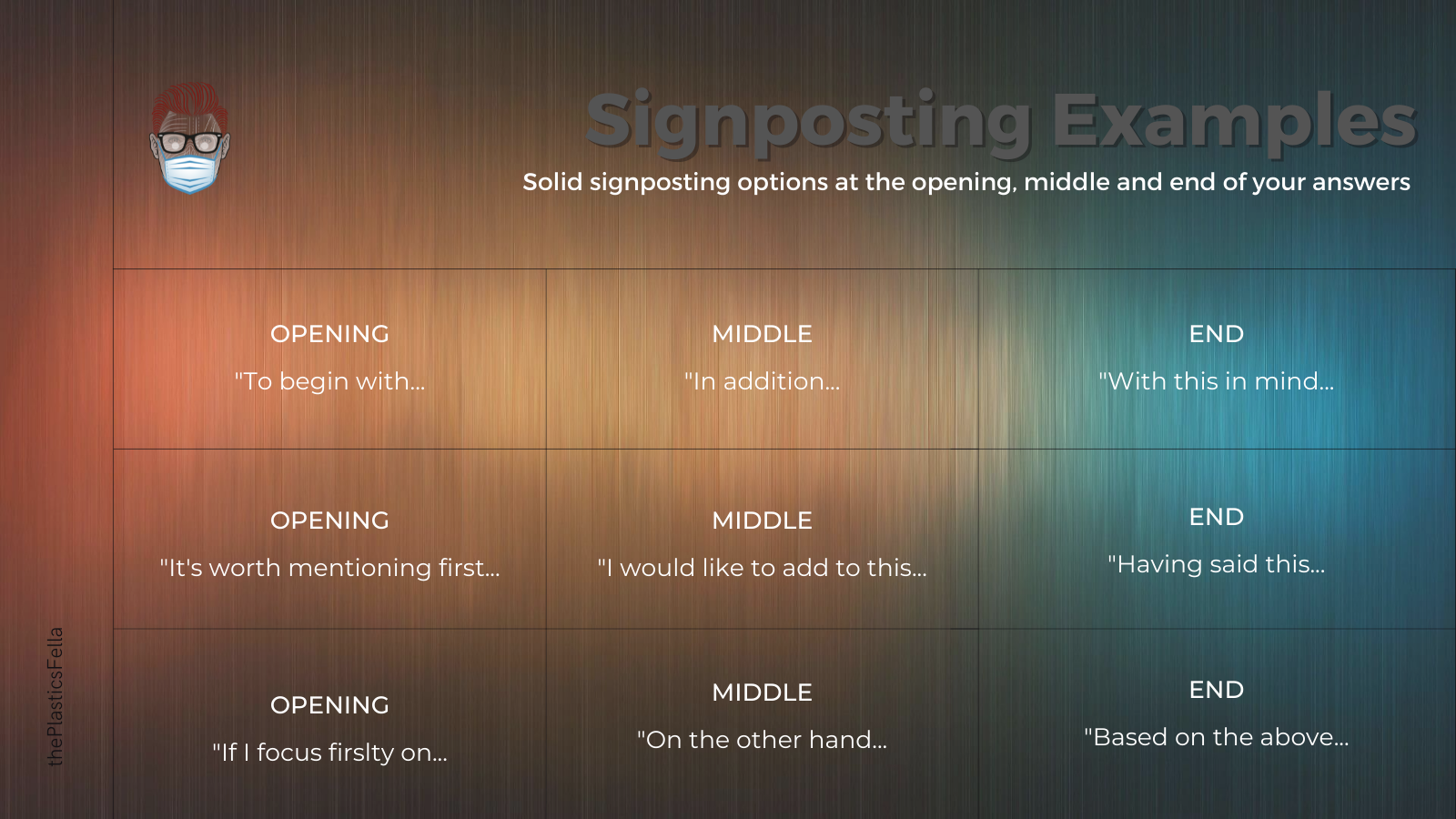
These are recommended by ThePlasticsFella because they aren't the mundane "first, secondly, finally" interlinking words, and also they aren't too "essay-like". It's important to be fluent and conversational using your own, every day, vocabulary.
Concise Answers
Key Point
Conciseness is key. Avoid monologues that can lead to interviewer disengagement.
The number one symptom in an interview is boredom. This is usually down to long monotonous answers, which even the most astute interviewer will find it difficult to concentrate and listen to.
Example:
- Good Candidate: "I manage clinical risks by adhering to protocols, continuous learning, and teamwork."
- Poor Candidate: "In my practice, I always follow the established protocols diligently, ensure that I am up to date with the latest developments in plastic surgery, and collaborate effectively with colleagues..."
This concise answer directly addresses the topic, demonstrating the candidate's ability to communicate key information efficiently. It reflects clarity of thought and respect for the interviewer's time
P'Fella has a rule of thumb: you should not be able to hear your own vice for 90 seconds straight (even that length is a pretty long time!). Let's use this TEDTalk for an example. Whilst it is a great presentation, ThePlasticsFella challenges you to watch 90 seconds of the video without your mind wandering.
That exercise should get the point across - nobody wants to hear your voice for too long!! Keep that in mind during your interview preparation.
Answer Directly
Key Point
Focus on answering what is asked. Avoid veering off-topic or giving generic responses.
Your course has been developed with several priorities - the ability to answer directly is one of them.
- Good Candidate: "I enhance patient safety by enforcing strict sterilization protocols, evidenced by a 30% reduction in post-operative complications in my department."
- Poor Candidate: "Patient safety is vital. I like reading medical history and organized team activities during my internship, which indirectly contributes to safety."
This response is focused and relevant, directly linking personal actions to measurable outcomes. It shows the interviewer that the candidate is result-oriented and can apply their skills effectively.
It's essential you listen to the question and you answer the question. This might seem pretty simple advice, but under the pressure of an interview, nothing is simple. Let's use this as an example below.

It's quite clear the Plastic Surgery interviewee did not under the purpose of the question. The question is about you, not anybody else. Failure to critically interpret the premise of the question results in failure to answer the question directly.
Language
Key Point
Your choice of words can significantly impact your message. Use strong, active verbs to convey a sense of action and commitment.
Mastering the use of power words and active verbs can dramatically elevate the impact of your responses, showcasing your actions and achievements with clarity and dynamism.
- Good Candidate:
"I optimized patient recovery protocols by implementing an advanced monitoring system, which revitalized our post-surgical care and reduced recovery times by 20%." - Poor Candidate:
"We made some changes to how we take care of patients after surgery, which helped them get better a bit faster."
The good example effectively uses power words like "optimized" and active verbs like "implementing" and "revitalized" to convey a strong, action-oriented approach. In contrast, the poor example lacks impact and specificity, failing to demonstrate the same level of initiative and effectiveness
Throughout the Plastic Surgery interviews, there are some of P'Fella's favorite phrases which contain "power words and active verbs".
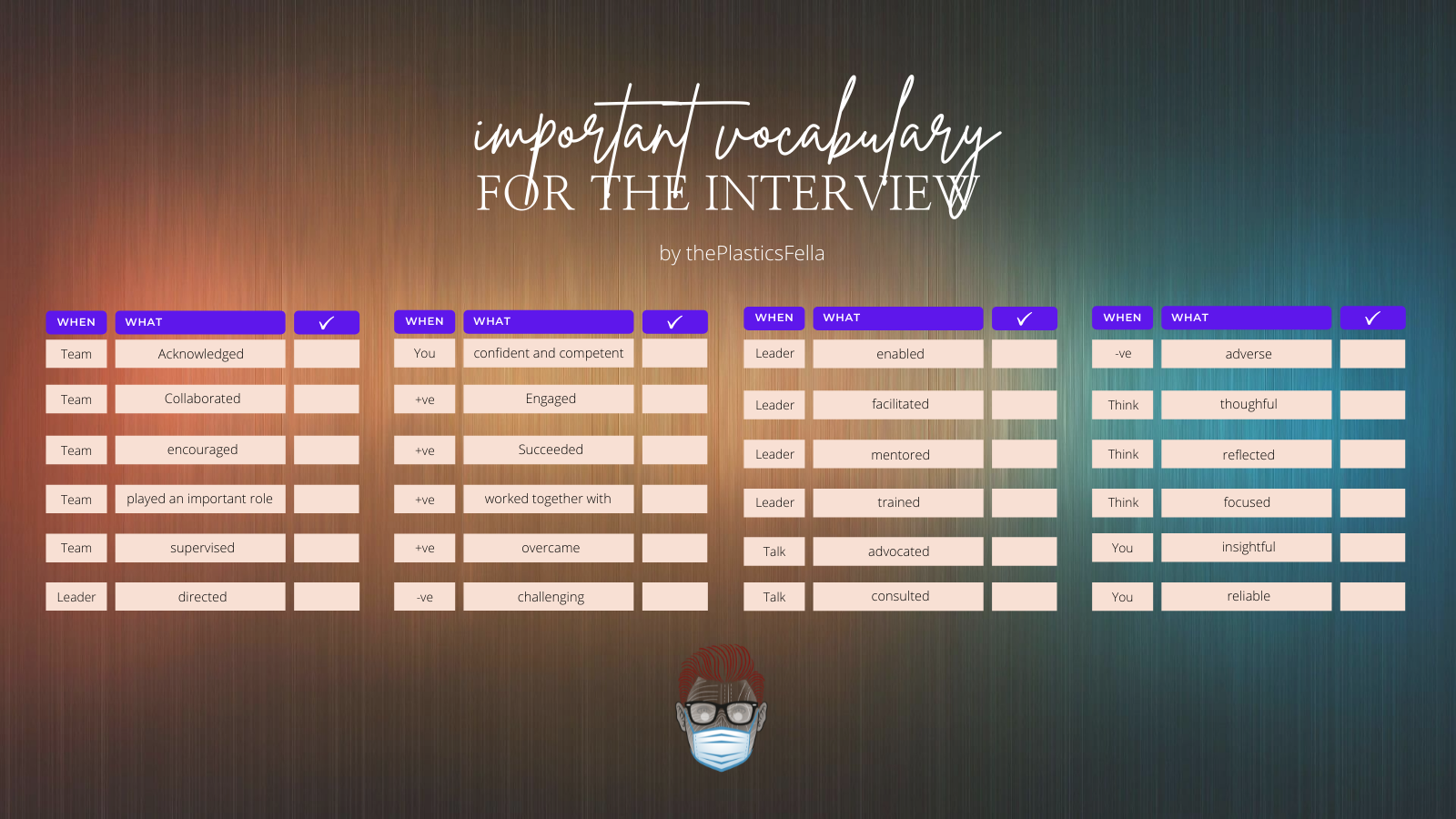
Don't remember these power words and phrases now. You can always come back to this lesson. And, you'll be picking up some more vocabulary on your journey.
Patient First
Key Point
Always position the patient's needs and safety at the forefront of your answers.
This is a simple lesson to learn - put patients first! There are only a handful of important people in your interview. This is explained in the infographic below.
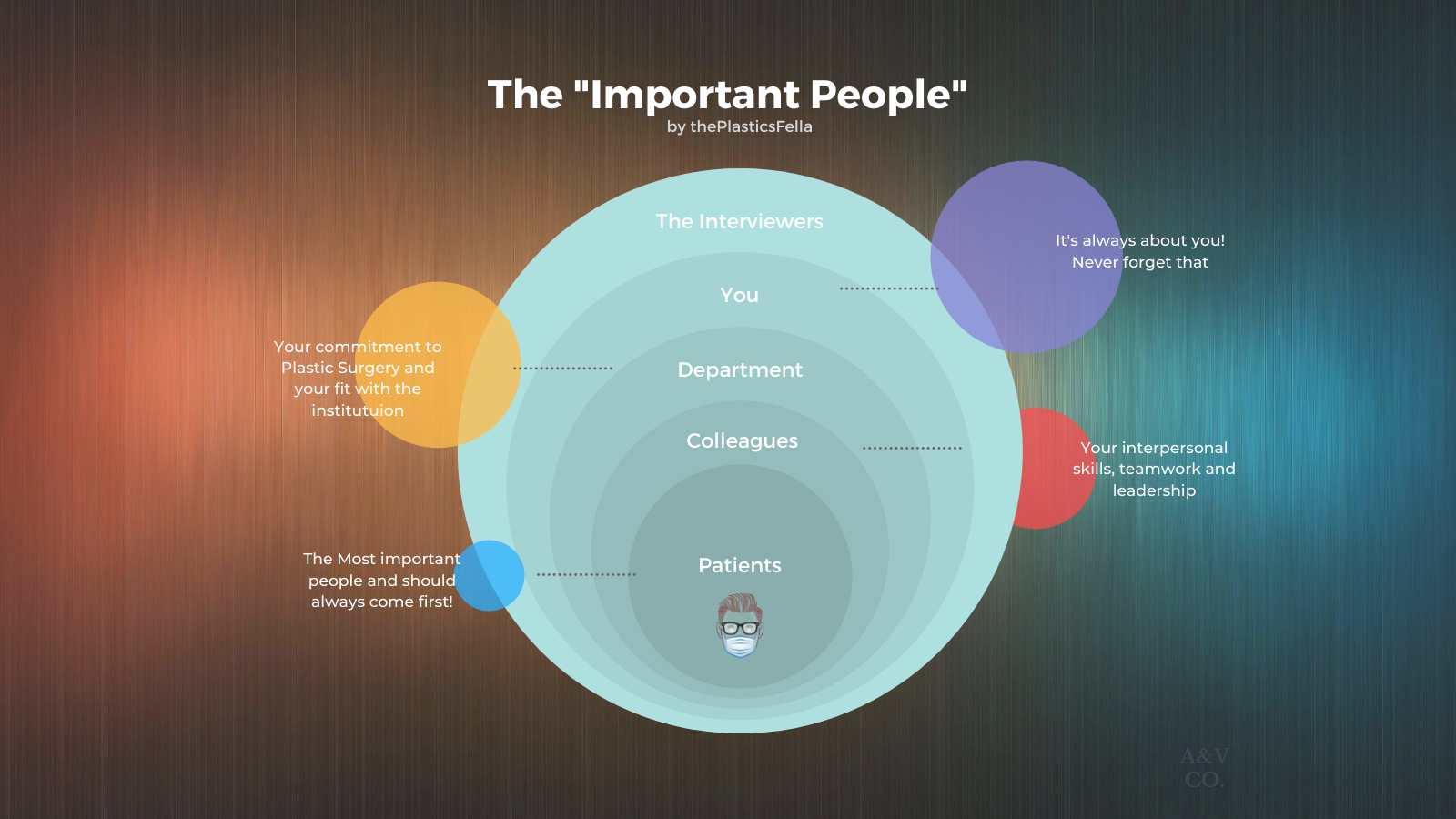
This companion will teach you when to prioritize the important people in your answer. Clue - it's always the patient!
- Good Candidate: "In a recent reconstructive surgery, I prioritized the patient's concerns about post-surgical scarring. By choosing a less invasive technique, we not only addressed the functional aspect but also significantly reduced the emotional impact, leading to higher patient satisfaction and a quicker recovery."
- Bad Candidatev: "In my surgeries, I focus on getting the procedure done efficiently. While patient concerns are considered, the primary goal is to complete the surgery successfully
This answer illustrates a compassionate approach, showing that the candidate values patient concerns and well-being. It demonstrates the ability to make patient-centered decisions, a crucial skill in plastic surgery.
By prioritizing patient needs and safety in your answers, you illustrate your commitment to holistic care, which is a key differentiator in a competitive field like plastic surgery. Remember, successful surgeons are those who blend technical skill with patient-centered care, and conveying this balance in your interviews can significantly elevate your candidacy.
Examples
Key Point
Focus on how to effectively align your real-world experiences with the question asked.
From an interviewer's perspective, it's easy to distinguish a "good" from an "amazing" Plastic Surgery interview candidate by their uses of real-world examples and quality evidence.
A candidate must support their subjective and objective statements through their CV, their surgical logbook, and evidence-based knowledge, where applicable. You must qualify what you quantify, otherwise what you say will just disqualify.
Here is an example below. Two candidates, with two different approaches.
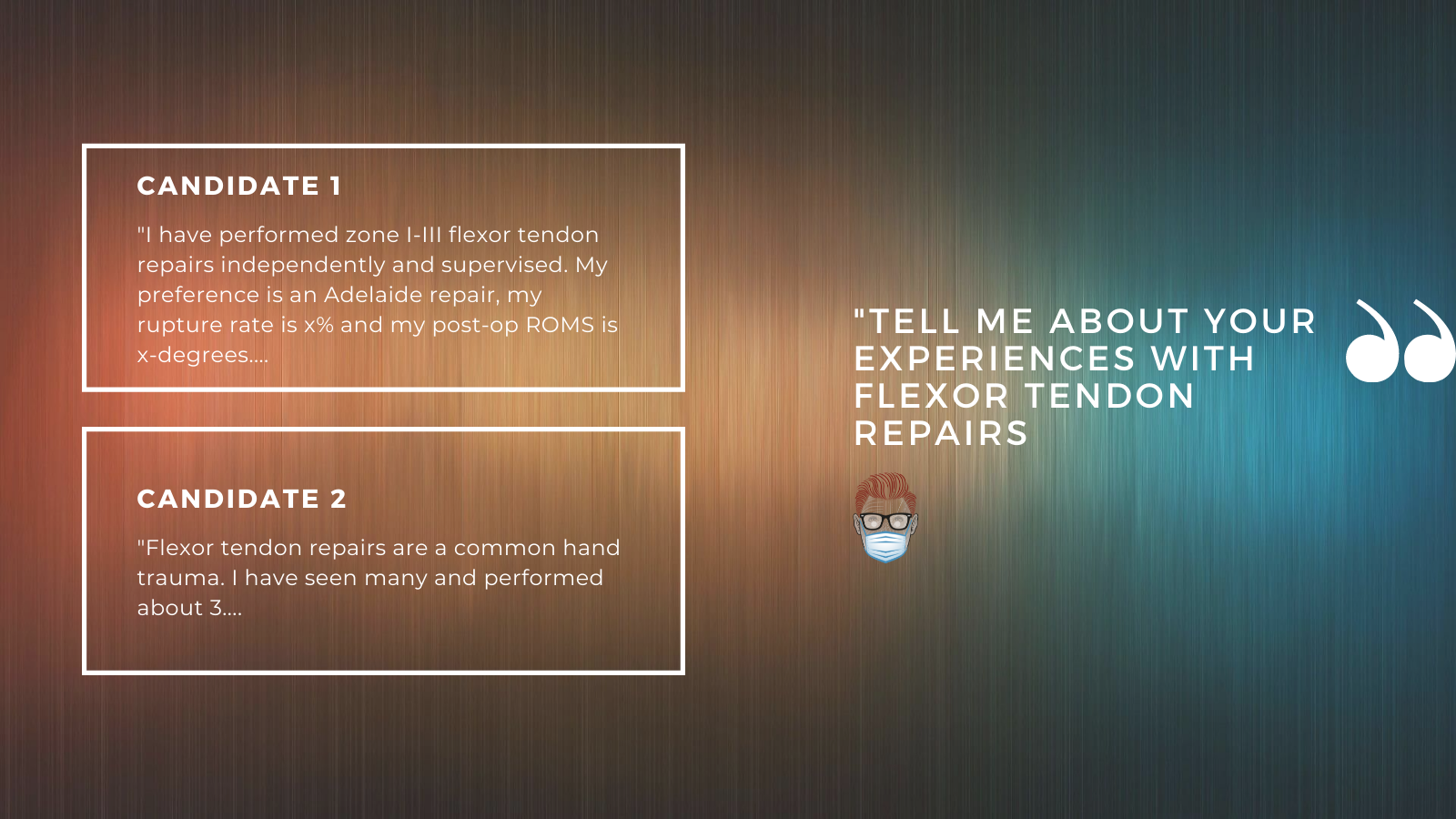
It's pretty clear that differences in the two candidates. Surprisingly, most candidates don't follow the lead of candidate 1. It's either because they have not prepared well or because they have crumbled under the pressure of an interview.
In a notable case, a plastic surgeon encountered a young patient requiring facial reconstruction. The patient, an aspiring artist, was particularly concerned about maintaining facial expressions, vital for their art.
Acknowledging these concerns, the surgeon adapted the usual procedure, choosing a technique that better preserved the patient's facial muscles. This approach required more precision and care but was crucial for the patient's quality of life.
The results were impressive. Not only was the reconstruction successful, but the patient retained complete expressiveness, enabling them to continue their artistic pursuits without any hindrance.
This story highlights the impact of a patient-first approach in plastic surgery, where understanding and prioritizing individual patient needs can lead to significantly better outcomes and satisfaction.
Look Forward!
Key Point
Develop techniques to stay composed and focused, even after challenging questions.
In the traditional interview setting, it was relatively "easy" to forget a bad interview question as you took a break between interview stations. In the virtual interview environment, this can be much harder. The interviewers are essentially always watching.
thePlasticsFella recommends a 3-second breath-hold. During this momentary pause, you will regather your confident thought process. And the best thing is, the interviewers on the other side of the webcam won't notice your stress levels.
Breath-Hold Exercise: Practice a 3-second breath-hold to reset and regain composure.
